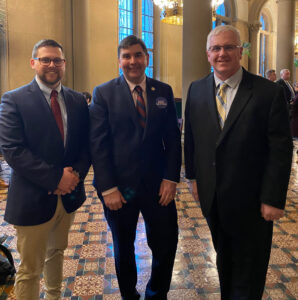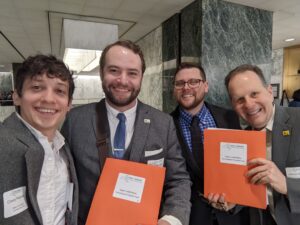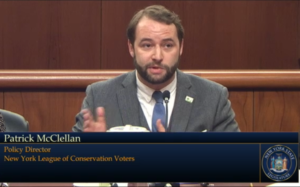With the 2023 Legislative Session now underway, the New York League of Conservation Voters’ work with lawmakers–a crucial part of achieving our goals–takes center stage. Last week, NYLCV was out in full force advocating for our 2023 environmental agenda at the New York State Capitol in Albany.
On Monday, February 13, NYLCV Policy Director Patrick McClellan and Deputy Director for State Policy Andrew Williams participated in Clean Fuels Lobby Day. They met with a number of elected officials, including Environmental Conservation Committee Chairs Senator Harckham and Assemblymember Glick as well as Energy Committee Chair Assemblyman Barrett, to discuss the importance of establishing a clean fuel standard (CFS), which is a proven, efficient, and cost-effective way to reduce CO2 emissions and pollution from the transportation sector. A CFS, which would incentivize the use of cleaner fuels, such as electricity, by making polluters pay for their development and deployment, is an opportunity for New York to lower greenhouse gas emissions and create a safer, healthier state without additional costs to the taxpayers. In addition to the two committee chairs, they also met with Senators Fernandez, Kavanagh, Skoufis, Mannion, and Hinchey, as well as Assemblymembers Solages and Fahy.
Environmental Conservation Committee Chairs Senator Harckham and Assemblymember Glick as well as Energy Committee Chair Assemblyman Barrett, to discuss the importance of establishing a clean fuel standard (CFS), which is a proven, efficient, and cost-effective way to reduce CO2 emissions and pollution from the transportation sector. A CFS, which would incentivize the use of cleaner fuels, such as electricity, by making polluters pay for their development and deployment, is an opportunity for New York to lower greenhouse gas emissions and create a safer, healthier state without additional costs to the taxpayers. In addition to the two committee chairs, they also met with Senators Fernandez, Kavanagh, Skoufis, Mannion, and Hinchey, as well as Assemblymembers Solages and Fahy.
On the morning of February 14, when lawmakers opened their mail, they were greeted not with a Valentine, but with a letter from the UpgradeNY coalition, of which NYLCV is a leading member, urging the legislature to include funding in the 2023-24 State budget to decarbonize state facilities, and support union jobs and local hiring, including from disadvantaged communities. Decarbonizing state buildings is a top priority for NYLCV this year and a critical component of meeting the goals set out in the Climate Leadership and Community Protection Act.
NYLCV continued to press lawmakers throughout the day–and well into the evening–on Tuesday, with Senior Vice President Josh Klainberg and Deputy Director for Politics Casey Petrashek joining McClellan and Williams in Albany for Environmental Protection Fund (EPF) Lobby Day and the Joint Legislative Public Hearing on the 2023-2024 Executive Budget.
 The NYLCV team met with several lawmakers, including Assemblymembers O’Donnell, Raga, and Cunningham, as well as staff from the offices of Senators Hoylman-Sigal, Palumbo, and Martinez, and the offices of Assemblymembers Lee, Solages, and Fall. They requested that the Assembly and Senate include a $400 million EPF in their budget–and this is key–without taking funds from it to cover staff.
The NYLCV team met with several lawmakers, including Assemblymembers O’Donnell, Raga, and Cunningham, as well as staff from the offices of Senators Hoylman-Sigal, Palumbo, and Martinez, and the offices of Assemblymembers Lee, Solages, and Fall. They requested that the Assembly and Senate include a $400 million EPF in their budget–and this is key–without taking funds from it to cover staff.
EPF funding is critical to the health of our environment and the prosperity of our communities. Unfortunately, the Governor’s budget proposal would allow EPF funding to pay for staffing at state agencies, which would direct money away from critical projects that reduce air pollution, safeguard clean drinking water, create parks and trails, support environmental justice programs, protect farms and forests, and improve quality of life in every county of the state.
They also advocated for issues beyond EPF funding, such as the inclusion of $1 billion for clean new water infrastructure (raising it from its current $500 million), $250 million for State Parks, and $90 million for the Department of Environmental Conservation.
It was 7 pm that evening when McClellan appeared before the Joint Committee on Environmental Conservation to  explain NYLCV’s position on Governor Hochul’s Executive Budget. He spoke about several key issues, including agency staffing, capital funding, green buildings, cap-and-invest, transportation, the Waste Reduction and Recycling Infrastructure Act, and housing. Watch his appearance here and read his full testimony here.
explain NYLCV’s position on Governor Hochul’s Executive Budget. He spoke about several key issues, including agency staffing, capital funding, green buildings, cap-and-invest, transportation, the Waste Reduction and Recycling Infrastructure Act, and housing. Watch his appearance here and read his full testimony here.
In all, the week of February 13th was an important mile marker on NYLCV’s path to fight climate change, conserve land and water, and protect public health in New York State. We were able to speak with lawmakers about important policies and programs that will help protect New York’s natural resources and create a more sustainable future. We look forward to continuing our advocacy work and working with the governor and legislators to pass smart environmental policy in the weeks and months to come.
